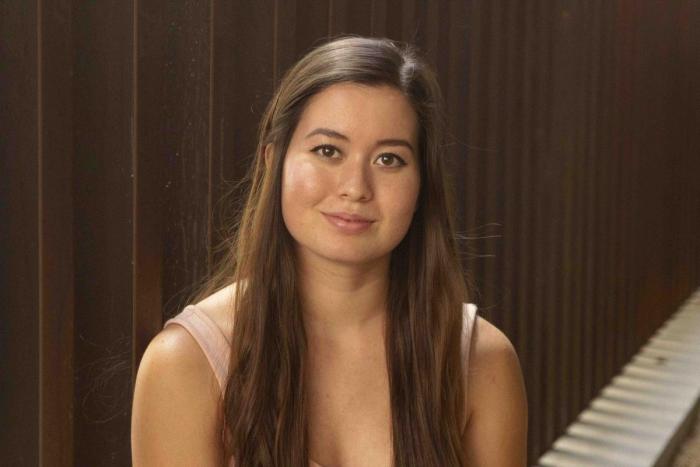“You can't get anything done alone!”

This is what Ayumi Pottenger told me when we sat down and chatted this month about her experiences as an undergraduate MCB major. Ayumi speaks from experience; she has been in science labs at the UA since her freshmen year when she worked for Dr. Nadja Anderson, Director of the BIOTECH Project. Ayumi did general lab work such as preparing solutions and prepping experiments. She learned many applicable science skills, including how to be a better scientist and understanding research requires collaboration and helping each other. “Ayumi takes advantage of adversity and utilizes it for beneficial outcomes. She is probably one of the most mature undergraduates I have had the opportunity to work with” Anderson commented about her experience with Ayumi.
However, Ayumi’s love of science began long before she started attending the University of Arizona. She was a Bioscience Ambassador at Marana High School for their biomedical program. Ayumi attended events at middle schools and at her high school getting students excited about science through fun demonstrations. As a senior in high school, Ayumi also participated in the UA’s BIOTECH Project, taking MCB 101 and 102. The project provides technical support to Arizona middle school and high school teachers to conduct molecular genetics experiments (DNA science) with their students.
Ayumi knew her future career would be as a scientist when she received a crash course in infectious diseases the summer after her freshmen year in college. Ayumi was the post-transplant caretaker for her mother after her mother received a kidney transplant. Ayumi had to learn how to prevent infections to ensure her mom recovered from her surgery. Transplant recipients must take anti-rejection medication which weakens their immune system to prevent rejection of the transplanted organ. This essentially makes them immunocompromised for the rest of their life. Suddenly, her mom was at risk from common microbes that don’t affect healthy individuals. She had to wear a mask on windy days, only drink and bathe in filtered water, and avoid raw food. Caring for her mother sparked her interest in infectious diseases.
Ayumi chose the University of Arizona because the UA had a lot of options available for research as an undergraduate student and for cost considerations. She was fully funded for her college tuition, fees, room and board through a variety of sources, including being an Arizona resident, financial aid and the Wildcat Excellence Scholarship.
Ayumi chose MCB as her major because she knew she would get the opportunity study cells on a basic level and then could go into just about any field with MCB as her foundation. Ayumi shared why she chose MCB as a major, “I felt there would be a lot of different opportunities and an MCB major wouldn't restrict me to one specific career. I know I will have a lot of options with an MCB degree.” When asked what she would say to students considering which major to choose, Ayumi advised, “If you major in science and take all of the opportunities available, you develop skills that you can apply to pretty much anything!”
When asked what her best experience has been at the UA so far, Ayumi enthused about the research she has been involved in. "I've learned new techniques that build on what I knew from my prior laboratory work. I've also applied for grants and awards to help fund my own research project, giving me a taste of what real research is like. This experience has confirmed that I wanted to continue my studies and get a PhD to do research." She is currently working in The Morrison Lab and primarily researches microglia in ischemic stroke. She helps with general ischemic stroke research in addition to working on her own project. Ayumi’s project is a collaboration with the Falk lab, who specialize in Parkinson’s disease research. They have combined their two specialties to look at microglia morphology in a pre-clinical model of Parkinson’s disease. Ayumi is fortunate to have two PI’s for her project: Dr. Torsten Falk and Dr. Helena Morrison. She was placed in her lab through the EHS-TRUE program (a program under the UBRP umbrella).
Along with the foundation of the core science classes and the research Ayumi has been involved in, she believes the other skills she has learned during college will be valuable. “Doing research helps you have an enduring spirit. It’s so easy to get discouraged if an experiment didn't work out or presentation didn't work out. I’ve learned to keep going, keep persisting.” Another key skill she has learned is public speaking. “People think research is just being in a lab, but public speaking is a big part of being successful. Research is generally publically funded through government grants, so we have an obligation to convey our research to the public in a way everyone can understand.” Additionally, conducting research and working in a group in some of her MCB courses offer new experiences. “Working collaboratively with others in a group is critical. You can't get anything done alone!” Ayumi noted.
While Ayumi reflects on her experiences at the UA thus far, she also keeps her eye on the future. She plans on applying to graduate school and wants to study infectious diseases. She would like to work for a major health organization (CDC or WHO) or in an unusual career - “There is a job called disease detective that sounds really interesting,” Ayumi considered, with a sparkle in her eye. With her enthusiasm, experience and energy, we can see Ayumi putting her talents to work successfully in just about any field!





